Culture: February 2011 Archives
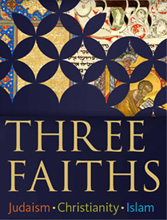
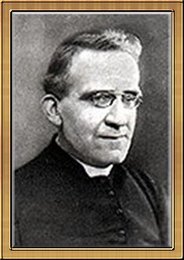
In the current issue of La Civiltà Cattolica, Jesuit Father Antonio Spadaro wrote an interesting essay, "The Thought of Henri Bremond." Matters pertaining to faith and reason, faith and culture interest me perhaps you. At least that's what I hope if you are a frequent reader of the Communio blog. Henri Bremond (1865-1933) is a former a Jesuit priest, literary scholar and was in the middle of the Modernist crisis. His literary output was terrific. Bremond was a member of the illustrious Académie Française succeedingm(elected in 1923 holding seat number 36). France also awarded the Lé d'honneur. The summary:
An attempt to
overcome the gap between faith and culture - In the years that saw the rise of
surrealism, of Freudian thought and of the modernist crisis, Henri Bremond
captured the separation that was growing between theology and culture
sanctioned by the Enlightenment. Bremond suffered in trying to find a
compromise in terms of language, seeking to show to a cultured audience the
best results of a religious sensibility and sought to show to his Catholic
readers the religious value of «profane» literature. Seeing the similarities
between a mystical and a poetic inspiration, he concluded that "it is up to the
mystic to explain the poet," reversing a common axiom. The article, on the
occasion of the reissue of his Prayer and poetry, absent from Italian
bookstores for three decades, presents the main insights of the priest,
academician of France.
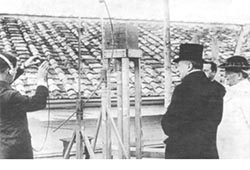 February 12, 1931, Vatican Radio began its social networking capabilities for Pope Pius XI who had a particular interest in evangelization, especially in the foreign lands. Guglielmo Marconi (1874-1937), the physics Nobel Prize laureate became the father of wireless communication. Quoting Marconi, the Vatican Press Director Jesuit Father Frederico Lombardi recalled, "My inventions are to save humanity, not to destroy it."
February 12, 1931, Vatican Radio began its social networking capabilities for Pope Pius XI who had a particular interest in evangelization, especially in the foreign lands. Guglielmo Marconi (1874-1937), the physics Nobel Prize laureate became the father of wireless communication. Quoting Marconi, the Vatican Press Director Jesuit Father Frederico Lombardi recalled, "My inventions are to save humanity, not to destroy it."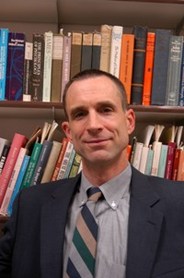 The Chairman of the Board of First Things, Robert Louis Wilken, announced that Russell R. Reno is the new editor of First Things.
The Chairman of the Board of First Things, Robert Louis Wilken, announced that Russell R. Reno is the new editor of First Things.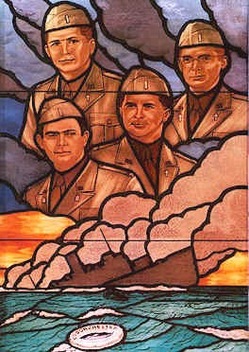
Besides being Saint Blase Day, today is also known as "Four Chaplains Day." The US Congress designated today to honor the 4 US Army chaplains who were serving on the USAT Dorchester during World War II.
Father John P. Washington (Roman Catholic priest), Rev. Clark V. Poling (Dutch reformed), Rev. George L. Fox (Methodist), and Rabbi Alexander D. Goode sacrificed their lives as their ship went down. 672 of 902 men died.
All of the chaplains held the rank of lieutenant.
The Episcopal Church has designated February 3 a liturgical memorial for these chaplains.
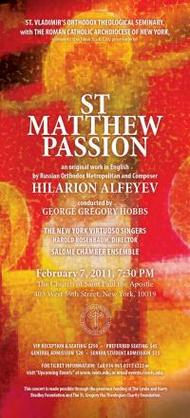
The St. Vladimir's Orthodox Theological Seminary (Yonkers, NY) will present a setting of the St. Matthew Passion.
The musical setting of Passion of Jesus Christ according to the Gospel of Saint Matthew is an exquisite interplay of soloists, choir, and orchestra. This concert will be the U.S. English-language premiere of the piece by Russian Orthodox Christian composer and churchman Metropolitan Hilarion Alfeyev.
Performers will include The Salomé Chamber Orchestra, famed soloists soprano Mary Mackenzie, mezzo-soprano Ana Mihanovic, tenor Blake Friedman, and bass Aaron Theno, and the New York Virtuoso Singers prepared by Harold Rosenbaum.
The concert will take place at 7:30 pm in the Church of the Saint Paul the Apostle (at the corner of Columbus Avenue & West 60th Street, NY 10019).
Please click HERE for more information and to purchase tickets.
Metropolitan Hilarion Alfeyev, 46, is the Russian born Oxford and Paris educated theologian and musician. He's wonderfully talented in many areas. Last May it was a pleasure of mine to see him and hear his work in Rome at a concert he organized for Pope Benedict XVI.
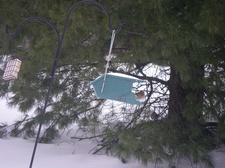 "The Snow-Storm" comes to mind today. There's a certain end-times (should we say a 19th century apocalypticism?) quality to Ralph Waldo Emerson's poem that life and death are confronted, forward motion is reduced-if-not-halted the boundaries are indistinct. Looking out my window I see the barrenness of the landscape with only the evergreens providing color save for the woodpecker, the bluejay and the cardinals collecting their food at the feeder. The property lines aren't present and movement is difficult either by foot, car, or train, and forget the airplane. The vivid white of the snow and ice is blinding.
"The Snow-Storm" comes to mind today. There's a certain end-times (should we say a 19th century apocalypticism?) quality to Ralph Waldo Emerson's poem that life and death are confronted, forward motion is reduced-if-not-halted the boundaries are indistinct. Looking out my window I see the barrenness of the landscape with only the evergreens providing color save for the woodpecker, the bluejay and the cardinals collecting their food at the feeder. The property lines aren't present and movement is difficult either by foot, car, or train, and forget the airplane. The vivid white of the snow and ice is blinding. 



